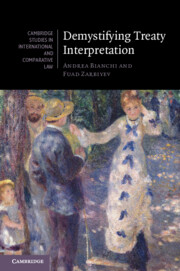Book contents
- Demystifying Treaty Interpretation
- Cambridge Studies in International and Comparative Law: 188
- Demystifying Treaty Interpretation
- Copyright page
- Contents
- Figures
- Preface
- Abbreviations
- 1 The Province of the Rules of Treaty Interpretation
- 2 The Interpreter’s Self
- 3 The Genealogy of the Contemporary Regime of Treaty Interpretation
- 4 Textualism
- 5 Intentionalism
- 6 What’s the Purpose of ‘Object and Purpose’?
- 7 Supplementary Means
- 8 The Magic of Systemic Integration
- 9 Inferential Reasoning and Its Consequences
- 10 Time and Treaty Interpretation
- 11 Text, Author, and Interpretive Control
- 12 Power, Persuasion, and Authority
- Annex Vienna Convention on the Law of Treaties 1969
- Index
- Cambridge Studies in International and Comparative Law
1 - The Province of the Rules of Treaty Interpretation
Published online by Cambridge University Press: 07 March 2024
- Demystifying Treaty Interpretation
- Cambridge Studies in International and Comparative Law: 188
- Demystifying Treaty Interpretation
- Copyright page
- Contents
- Figures
- Preface
- Abbreviations
- 1 The Province of the Rules of Treaty Interpretation
- 2 The Interpreter’s Self
- 3 The Genealogy of the Contemporary Regime of Treaty Interpretation
- 4 Textualism
- 5 Intentionalism
- 6 What’s the Purpose of ‘Object and Purpose’?
- 7 Supplementary Means
- 8 The Magic of Systemic Integration
- 9 Inferential Reasoning and Its Consequences
- 10 Time and Treaty Interpretation
- 11 Text, Author, and Interpretive Control
- 12 Power, Persuasion, and Authority
- Annex Vienna Convention on the Law of Treaties 1969
- Index
- Cambridge Studies in International and Comparative Law
Summary
The rules of treaty interpretation of the Vienna Convention on the Law of Treaties have a special status in international law, dominating the vocabularies and minds of international lawyers. They are ubiquitous – they are always visible, regardless of where one stands in the international legal arena, and they also provide for a sense of community amongst scholars and practitioners, who are constantly reassured by their presence. This chapter argues that it is illusory to believe that the function of the rules of treaty interpretation is to directly bridge the gap between the signifier (treaty provision to be interpreted) and the signified (the meaning of the treaty provision). In fact, ‘rules’ are not determinative of meaning. They only aim to impose a ‘common discipline’ with respect to the admissible ‘sources of interpretive data’ that can be used in treaty interpretation. Furthermore, as there is no unmediated access to any signifier, the rules of interpretation are themselves subject to interpretation. The chapter concludes by shifting the attention from the rules of treaty interpretation to the notion of interpretive authority as a useful complement to understanding the process of treaty interpretation.
Keywords
Information
- Type
- Chapter
- Information
- Demystifying Treaty Interpretation , pp. 1 - 22Publisher: Cambridge University PressPrint publication year: 2024
